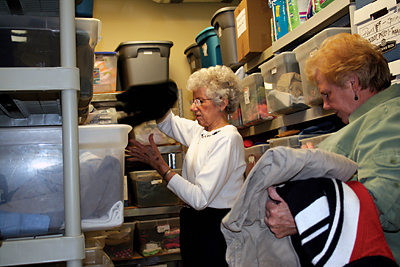
 COLUMBIA—A tall young man with a short beard and wearing a knit stocking cap stood at the door of the Catholic Charities office on a recent morning.
COLUMBIA—A tall young man with a short beard and wearing a knit stocking cap stood at the door of the Catholic Charities office on a recent morning.
Cold, wet weather blown in by Hurricane Ida was just starting to hit downtown Columbia, and the man had no coat. His few possessions had been stolen.
Volunteers Claire Wagner and Angie Peake sifted through a bin marked “men’s coats” to find something for him. Trench coats, a down jacket and a raincoat all were too small. Finally, Wagner found a white, waist-length jacket with colored stripes. The man tried it on.
“Hey, it’ll work, it’s a coat!” he said with a smile.
For more than six years, Peake and Wagner, along with volunteer Gwen Skipper, have spent their Tuesday mornings at the closet, putting clothes on the backs and shoes on the feet of homeless and needy people in the area. It is located adjacent to St. Peter Church and is open from 9 a.m. to noon each Tuesday.
Mary Gohean, regional coordinator for Catholic Charities in the Midlands Deanery, said the three are indispensable.
“I can’t say enough good things about them,” Gohean said. “They come faithfully every week and rarely miss a week. If there’s something we’re out of, they help us find it. They don’t want to have to go to the door and tell someone we don’t have what they need. These women are a testament to the faith. The mission of Catholic Charities is to witness to the salvation of Jesus Christ, and that is exactly what they are doing.”
Catholic Charities keeps a supply of donated clothes for men, women and children, separated into bins by size, type and season. The volunteers take down the names of those they serve because people can only visit the closet once every 30 days.
When they aren’t serving people who come to the door, the women work to fill family orders that are submitted separately.
Gohean said the bad economy has more people looking for clothes. On average, the closet has served more than 150 clients a month in 2009.
Most of the time the women give out sweatshirts, coats, pants, socks, underwear and shoes. The small supply of donated dress clothes go to people who sometimes come in looking for something suitable to wear to a relative’s wedding or funeral.
Skipper, a member of St. Joseph Church, has volunteered with Catholic Charities since 2001. She said it’s the occasional success stories that make the work worthwhile.
“Every week we hope there’s going to be one, that we’ll hear someone is off the streets or has a job,” she said. “The hope is that always one of these people will find their path. Our goal is to bring the homeless people some dignity. Sometimes we’ll get people who need to be dressed for a job interview, and it’s great to be able to find something for them that will help them make a change in their lives, help them to help themselves.”
Peake, a member of St. Peter Church, has volunteered since 2004.
“The fact I see each week we are helping people, taking a primary role in helping them, is why I do it,” she said.
When not working with clients, the volunteers spend the morning sorting and measuring donations. During the rest of the week, the women scour local thrift and discount stores to find extra clothing and other items the closet needs. They know when and where special offers can be found, and what stores specialize in good quality items at a low price. Each week when they leave, they have a list of needed items.
On this Tuesday, shoelaces are in demand because some gently used sneakers have been donated without any laces. Occasionally, they take things home that must be laundered or mended.
Faith motivates them. Most weeks, these women attend morning Mass before coming to work. Skipper said she often finds inspiration for her work in the daily readings, which stress the message of helping the less fortunate and doing all that is possible to assist others.
Wagner said not all of the people they serve are in good moods or show gratitude, but each person is treated with respect and given a smile and greeting.
“When you help someone at the door and they are very grateful, you come back in here and know it’s worth it,” she said. “Some people want to hug you. Just one big ‘thank you’ at the door lets me know why I come back here every week.”
